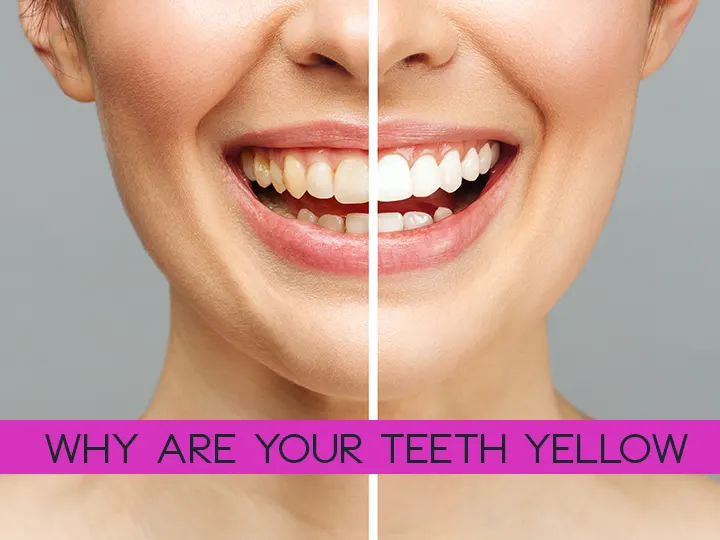
Why are Your Teeth Yellow?
Teeth can become yellow for a variety of reasons. One of the most common causes is plaque buildup. Plaque is a film of bacteria that forms on teeth and can be caused by a lack of proper oral hygiene. When plaque is not removed through regular brushing and flossing, it can harden into tartar, which can only be removed by a dentist or dental hygienist. The bacteria in plaque and tartar produce waste products that can stain the surface of the teeth.
Another common cause of yellow teeth is the consumption of staining substances such as coffee, tea, red wine, and tobacco. These substances can penetrate the enamel on the surface of the teeth and cause discoloration.
Age can also be a factor in yellowing teeth. As we age, the enamel on our teeth naturally wears down, revealing the dentin beneath. Dentin is naturally a yellow color, so as the enamel wears down, the teeth may appear more yellow.
Certain medications can also cause yellowing of the teeth. Some antibiotics, such as tetracycline and doxycycline, can cause discoloration if they are taken during tooth development (typically before age 8). Additionally, some antihistamines, antipsychotics, and blood pressure medications can cause the teeth to yellow.
Genetics can also play a role in the color of one's teeth. Some people are born with denser, more yellow dentin, which can make the teeth appear more yellow.
In general, yellow teeth are a cosmetic issue that can be treated through professional teeth whitening or at-home whitening kits. However, if yellowing is caused by a buildup of plaque or tartar, it is important to address this through proper oral hygiene and regular dental checkups. Additionally, if yellowing is caused by a medical condition or medication, it is important to consult with a dentist or physician to determine the best course of action.
What can be done to make teeth whiter?
Having white teeth is a common goal for many people, as a bright and white smile can boost one's confidence and improve overall appearance. There are several ways to make teeth appear whiter, some of which can be done at home and others that require professional intervention.
One of the simplest ways to make teeth appear whiter is to improve oral hygiene.
Brushing and flossing regularly can help remove plaque and tartar buildup, which can cause teeth to appear yellow. Additionally, using an antiseptic mouthwash can help kill bacteria that can contribute to discoloration.
Another way to make teeth appear whiter is through the use of at-home teeth whitening products. These can include whitening toothpastes, which typically contain mild abrasives that can help remove surface stains, and over-the-counter whitening gels and strips, which contain a low concentration of hydrogen peroxide. These products can help to remove surface stains, but results may vary and some people may not see significant improvement.
Professional teeth whitening is another option that can be more effective than at-home treatments. This can be done in a dentist's office or through take-home kits provided by a dentist. In-office whitening typically involves the use of a stronger bleaching agent and a special light or laser to activate the bleaching process. This can produce dramatic results in a short amount of time. Take-home kits, on the other hand, include custom-fit trays that are filled with a bleaching gel and worn for a specific period of time each day. Both in-office and take-home whitening treatments can be more effective than over-the-counter products but are more expensive.
Another professional treatment option is the use of dental veneers. These are thin shells of tooth-colored material that are custom-made to fit over the front surface of the teeth. Veneers can help to mask discoloration and other imperfections in the teeth, giving them a brighter and more uniform appearance.
It's important to note that teeth whitening is not a one-time process and results may vary depending on the individual. In order to maintain the whiteness of the teeth, it is important to avoid consuming staining foods and drinks, like coffee, tea, red wine, cola and smoking. Regular dental visits and proper oral hygiene can also help to keep teeth looking white. If you're considering teeth whitening, it is recommended to consult with a dentist to determine the best course of action for you and your specific needs.
